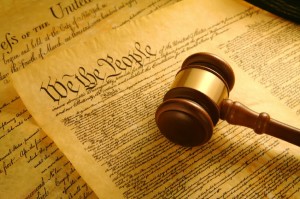by Patrick Barron – Mises Daily:
Can we have political liberty without first having economic freedom? Is the form of government predetermined by the form of economic organization? At first blush the opposite would seem to be self-evident, i.e., that our form of government determines all else, including our economic structure. But Mises advises otherwise. In Human Action (page 283 of the Mises Institute’s scholars’ edition), Mises explains (my emphasis):
“Freedom, as people enjoyed it in the democratic countries of Western civilization in the years of the old liberalism’s triumph, was not a product of constitutions, bills of rights, laws, and statutes. Those documents aimed only at safeguarding liberty and freedom, firmly established by the operation of the market economy, against encroachments on the part of officeholders.”
Likewise, in The Law by Frédéric Bastiat (page 49 of the Mises Institute edition),
Frédéric Bastiat has this to say (my emphasis again):
“Political economy precedes politics: the former has to discover whether human interests are harmonious or antagonistic, a fact which must be settled before the latter can determine the prerogatives of Government.”
Economic Freedom Is the Foundation of All Freedom
These insights counsel us that attempts to pass laws — or even constitutional amendments — to ensure our political liberty will be wasted as long as our economic freedom continues to be usurped by government. In other words, limited government will fade in the face of the modern regulatory state, and no laws can protect us from its deprivations. Economics not only trumps politics, it determines its very form.
The root cause of economic interventions is the mistaken belief that government can improve our lives by making economic decisions for us. As I explained in an earlier essay, by their very nature, economic interventions by government are coercive in nature. Voluntary cooperation in the marketplace, on the other hand, requires only access to an honest criminal justice system to enforce contracts and protect property rights.
Government mandates require government coercion for their enforcement, including, for example, the mandate that everyone contribute to the government’s Social Security and Medicare programs. Although the public requires no government mandate to buy any of the wide ranging retirement savings and health insurance products available on the free market, government must force us to participate in its Social Security and Medicare schemes.
Absent the mandates, few would participate, because many understand that these programs are fatally flawed transfer taxes — Ponzi schemes of sorts — posing as retirement savings and healthcare plans. There are no real profit-producing assets from which to pay the plans’ distributions, merely the promise by government that it will continue to force others to pay you in the future as it forces you to pay others in the present.
These programs must be maintained by the police power of the state, and what may appear to be widespread acceptance of the Social Security and Medicare mandates is really the vociferous support of those receiving benefits. Meanwhile, the taxpayers who understand the reality of the program continue to pay to stay out of jail.
Economic Regulation Requires Coercion
The more government meddles in the economic sphere — which should require no regulation at all, since it is completely voluntary — the more police power is necessary to force us to comply. All government agencies possess huge enforcement mechanisms that not only can confiscate our property but take away our freedom. The Occupational Safety and Health Administration (OSHA) is little more than a government-supported extortion racket, finding nebulous health and safety violations in the workplace that apparently do not concern the actual workers themselves, who haven’t been chained to their machines for quite some time now.
The Environmental Protection Agency (EPA) shuts down businesses and threatens entire industries for violations of arbitrarily established environmental standards that are of little concern to the people affected. Smokestack emissions and the like are local environmental issues for which one would expect a wide variety of standards across the nation. Undoubtedly the people employed by the giant steel mills of Gary, Indiana tolerate smokestack emissions that Beverly Hills residents would find unacceptable. These arbitrary EPA standards are depriving Americans of the opportunity to work at higher paying jobs: their freedom to tolerate more pollution in order to enjoy a higher standard of living has been usurped by government.
Speaking of jobs, just try practicing some profession that requires a government issued license, even if the parties using your service do not care whether you have one or not. Better yet, employ someone who is willing to work at a wage rate below the proscribed minimum or who is willing to work without healthcare or family leave benefits. The police power of the state will descend upon you, even though there is no dispute between you and your employee. Want to reclaim discarded furniture, refurbish it, and sell it out of your house? Better not try to do that without a business license and a store front in an area that is properly zoned. Do you want to hire “an able bodied man” to do some heavy lifting at your place of business? Uh, oh! The discrimination police will put you in your place, which may be a jail cell if you cannot pay their fine.
No truly limited government can perform these police functions, so expecting a limited government in a world where such regulations are common falls into the category of a cognitive dissonance. In laymen’s terms, we are just kidding ourselves that we are a truly free people with a government that is subservient to our wishes and exists primarily to protect our life, liberty, and property. Keep this in mind the next time you hear that some new economic regulations have been proposed or implemented. Concomitant with these regulations comes an ever more powerful and coercive government.
Article originally posted at Mises.org.





